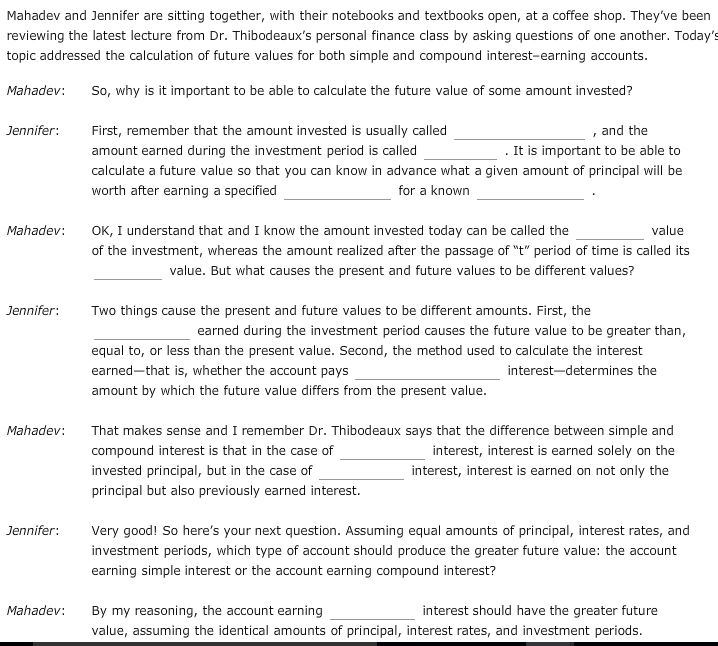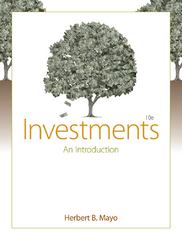Answered step by step
Verified Expert Solution
Question
1 Approved Answer
each blank has 2 drop down answers i will type the choices out 1.maturety payment OR principal 2. intrest OR principal 3. Period of time

each blank has 2 drop down answers i will type the choices out
1.maturety payment OR principal
2. intrest OR principal
3. Period of time OR interest rate
4. period of time OR interest rate
5. present OR future
6. present OR future
7.interest rate OR annuity
8.Straight or blended OR simple or compound
9.simple OR compound
10.simple OR compound
11 compound OR simple
Mahadev and Jennifer are sitting together, with their notebooks and textbooks open, at a coffee shop. They've been reviewing the latest lecture from Dr. Thibodeaux's personal finance class by asking questions of one another. Today's topic addressed the calculation of future values for both simple and compound interest-earning accounts Mahadev: So, why is it important to be able to calculate the future value of some amount invested? Jennifer: First, remember that the amount invested is usually called amount earned during the investment period is called calculate a future value so that you can know in advance what a given amount of principal will be worth after earning a specified and the It is important to be able to for a known Mahadev: OK, I understand that and I know the amount invested today can be called the of the investment, whereas the amount realized after the passage of "t" period of time is called its alue value. But what causes the present and future values to be different values? Jennifer: Two things cause the present and future values to be different amounts. First, the earned during the investment period causes the future value to be greater than, equal to, or less than the present value. Second, the method used to calculate the interest earned-that is, whether the account pays amount by which the future value differs from the present value interest-determines the Mahadev: That makes sense and I remember Dr. Thibodeaux says that the difference between simple and compound interest is that in the case of invested principal, but in the case of principal but also previously earned interest. interest, interest is earned solely on the interest, interest is earned on not only the Jennifer: Very good! So here's your next question. Assuming equal amounts of principal, interest rates, and investment periods, which type of account should produce the greater future value: the account earning simple interest or the account earning compound interest? Mahadev: By my reasoning, the account earning value, assuming the identical amounts of principal, interest rates, and investment periods interest should have the greater future
Step by Step Solution
There are 3 Steps involved in it
Step: 1

Get Instant Access to Expert-Tailored Solutions
See step-by-step solutions with expert insights and AI powered tools for academic success
Step: 2

Step: 3

Ace Your Homework with AI
Get the answers you need in no time with our AI-driven, step-by-step assistance
Get Started


